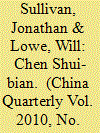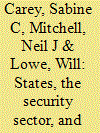|
|
|
Sort Order |
|
|
|
Items / Page
|
|
|
|
|
|
|
| Srl | Item |
| 1 |
ID:
174450


|
|
|
|
|
| Summary/Abstract |
Researchers often lack the necessary data to credibly estimate racial discrimination in policing. In particular, police administrative records lack information on civilians police observe but do not investigate. In this article, we show that if police racially discriminate when choosing whom to investigate, analyses using administrative records to estimate racial discrimination in police behavior are statistically biased, and many quantities of interest are unidentified—even among investigated individuals—absent strong and untestable assumptions. Using principal stratification in a causal mediation framework, we derive the exact form of the statistical bias that results from traditional estimation. We develop a bias-correction procedure and nonparametric sharp bounds for race effects, replicate published findings, and show the traditional estimator can severely underestimate levels of racially biased policing or mask discrimination entirely. We conclude by outlining a general and feasible design for future studies that is robust to this inferential snare.
|
|
|
|
|
|
|
|
|
|
|
|
|
|
|
|
| 2 |
ID:
100501


|
|
|
|
|
| Publication |
2010.
|
| Summary/Abstract |
Chen Shui-bian achieved an international reputation for his promotion of Taiwan independence. Whilst that reputation may have been well earned, the analyses on which this conclusion is based are frequently flawed in two ways. First, by using an undifferentiated notion of independence, they tend to conflate sovereignty with less threatening expressions of Taiwanese identity and pro-democracy discourse. Second, by failing to take into account the impact of immediate strategic context, analysts ignore a fundamental element of democratic political communication. In our empirical analysis of more than 2,000 of Chen's speeches, we seek to avoid both flaws by unpacking the concept of independence and taking into account Chen's strategic relationship with his primary audiences. Our findings challenge popular portrayals of Chen, but more importantly they have strong implications for policy makers and students of political rhetoric with regard to current and future ROC presidents.
|
|
|
|
|
|
|
|
|
|
|
|
|
|
|
|
| 3 |
ID:
079908


|
|
|
|
|
| Publication |
2007.
|
| Summary/Abstract |
Why do some minorities seek affirmative action while others pursue territorial autonomy or secession, given similar conditions at the substate level? This article attempts to unpack the puzzle of minority radicalization, focusing on group claim-making as an important dynamic that has been overlooked by much of the recent quantitative literature on ethnic conflict. To address this gap, the authors introduce a new `claims' variable, which codes the demands made by groups in the Minorities at Risk dataset for three five-year periods from 1985 to 2000. The authors examine the relationship between minority claim-making and rebellion and conclude that they are similar but distinct forms of group mobilization. Groups use claims as a means of bargaining with the center; relative power, therefore, has a critical influence on the extremity of demands that groups advance against the government. The authors test this model against alternative arguments using ordinal logit analysis and find that factors related to strategic power - including a history of autonomy, outside military support, and territorial concentration - are all positively correlated with a group's propensity to advance more extreme demands. This study shows that minorities with greater power vis-à-vis the center are more likely to both rebel and mobilize around separatist demands. However, minority rebellion - unlike separatist claims - may also be triggered by group deprivation, indicating that violent resistance may be driven by grievances as well as opportunities
|
|
|
|
|
|
|
|
|
|
|
|
|
|
|
|
| 4 |
ID:
121801


|
|
|
|
|
| Publication |
2013.
|
| Summary/Abstract |
This article introduces the global Pro-Government Militias Database (PGMD). Despite the devastating record of some pro-government groups, there has been little research on why these forces form, under what conditions they are most likely to act, and how they affect the risk of internal conflict, repression, and state fragility. From events in the former Yugoslavia, Iraq, Sudan, or Syria and the countries of the Arab Spring we know that pro-government militias operate in a variety of contexts. They are often linked with extreme violence and disregard for the laws of war. Yet research, notably quantitative research, lags behind events. In this article we give an overview of the PGMD, a new global dataset that identifies pro-government militias from 1981 to 2007. The information on pro-government militias (PGMs) is presented in a relational data structure, which allows researchers to browse and download different versions of the dataset and access over 3,500 sources that informed the coding. The database shows the wide proliferation and diffusion of these groups. We identify 332 PGMs and specify how they are linked to government, for example via the governing political party, individual leaders, or the military. The dataset captures the type of affiliation of the groups to the government by distinguishing between informal and semi-official militias. It identifies, among others, membership characteristics and the types of groups they target. These data are likely to be relevant to research on state strength and state failure, the dynamics of conflict, including security sector reform, demobilization and reintegration, as well as work on human rights and the interactions between different state and non-state actors. To illustrate uses of the data, we include the PGM data in a standard model of armed conflict and find that such groups increase the risk of civil war.
|
|
|
|
|
|
|
|
|
|
|
|
|
|
|
|
|
|
|
|
|